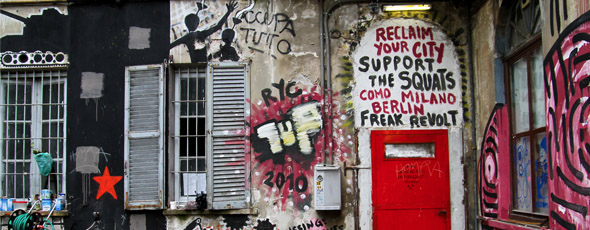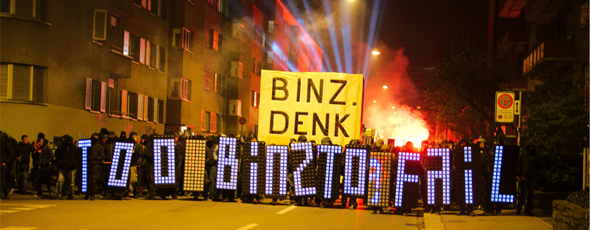Feel as though nobody cares if I live or die
So I might as well begin to put some action in my life
– Judas Priest, Breaking the Law
At midnight on the 1st September 2012 it became a criminal offence to live or intend to live in a residential building having entered as a trespasser, punishable by up to six months in prison and/or a fine of up to £5,000. Section 144 of the LASPO Act meant practically that people already living in squatted residential properties would be committing the offence. Thousands of people went to bed on a Wednesday night and woke up in their beds facing the prospect of arrest and imprisonment.
Though the criminalisation of squatting and other forms of trespass has long been a project of politicians of all hues – it was, after all, a Labour government that attempted to criminalise trespass in the late 70s – previous attempts have fallen short of their aims, largely due to the successful campaigns and opposition mounted against them. This latest attempt has created a criminal offence of squatting in relatively specific circumstances, so squatting is still legal, though several Conservative MPs have expressed intentions to extend the legislation to cover all types of buildings.
The Squatters Legal Network was formed to support squatters and other vulnerably housed people who would be affected by the new law. We have a 24hr emergency phone line to provide legal advice on the new law and other legislation that affects squatters, homeless people and other precariously housed people. We do arrestee and prisoner support, and we try and help people who get charged (with the help of decent solicitors’ firms) to ensure the best outcome for defendants. We also track and record the enforcement of the new law and host legal workshops on s144.
The clause that would criminalise squatting in residential buildings was tacked on to a Bill already in its third reading in the Commons: the Legal Aid, Sentencing and Punishment of Offenders Bill. Our main focus has been on the immediate impacts of s144 – the arrests, charges and court cases of squatters, and dealing with the misuses and abuses of the new law by cops and property owners. It is now becoming clear that there will be other, wider reaching effects of the Act that s144 was appended to, beyond criminalising people for occupying empty properties.
The Legal Aid, Sentencing and Punishment of Offenders Act introduced deep cuts to the provision of Legal Aid which will have profound effects on the way that working-class people will experience civil law. Some of these changes have already been made but we will feel its full effects in the autumn, when the Act will effectively remove financial support for most civil cases involving housing, benefits, medical negligence, employment, debt and immigration. The cuts also have dire implications for Law Centres and Citizens Advice Bureau, some of which have had to close already.
Further changes to Legal Aid are being consulted on at the moment that would have implications for criminal courts. The Ministry of Justice plan to reduce the 1,600 solicitors registered to provide legal aid to 400. It will also introduce “competitive tendering” for cases with companies such as G4S and Eddie Stobart competing to contract out cases to barristers – the same “race to the bottom” logic of competition that has seen every public service that has been privatised degraded and devalued. Under the current proposals those that do end up in prison will no longer be entitled to legal aid if they challenge their treatment in jail, and Judicial Reviews will also be harder to bring.
We might say that the right to the city must include the right to legal representation. The city is a constantly contested space and this contestation necessarily involves oppressive apparatuses: the Police, Her Majesty’s Courts and Tribunal Service, and Her Majesty’s Prison Service. These apparatuses have always been skewed toward the wealthy, white and male, but the cuts to Legal Aid that have already been made, as well as the cuts to come, will further deny access to representation by those who can least afford it. If the right to the city, the “right to change ourselves by changing the city”, necessarily involves conflict with power, then by removing our ability to defend ourselves properly in their courts the State is removing an aspect of our right to the city.
We might also articulate the issue in more practical terms – what are we to do? What would a necessary alternative to Legal Aid look like and how would it function? If a defendant is no longer legally aidable how will we secure representation for them? How do we keep ourselves and each other out of prison?
These questions have a particular importance in a time of crisis. As long as the city is a contested space, a site of conflict and contradiction, people will need representation for housing, benefits, immigration, protest and other criminal charges that politicised activity incur. It is in times of crisis that we see a rise in militancy (if the law does not work for us, then we will necessarily defy it) but also a rise in repression and repressive measures; the creation of new criminal laws and the intensification of policing, among others.
There are numerous legal support and defence groups that serve different communities and specialise in different aspects of law. Groups like the Legal Defence and Monitoring Group and Green and Black Cross do invaluable work for those who protest and participate in direct action
Legal defence groups and networks have a long and rich history in the UK from the early trade union movements, through to the Miners’ strikes of the 80s, the Poll Tax rebellion and protest movements of the 90s, the more recent student movement and the August riots of 2011. The issue at hand is that the model these groups follow (as well as organisations like Law Centres) largely relies on Legal Aid to pay the solicitors and barristers to represent people. If the ability to do that is withdrawn, then that model may cease to be financially viable.
The changes to legal aid also present a problem for solicitors and barristers. Apart from the ethics of denying representation to those who cannot afford it, many criminal solicitors and barristers will see a sharp decline in cases and clients and many may even stop practising. How can we retain their skills and knowledge when the financial mechanisms by which they function are withdrawn?
What other forms of support can lay people offer each other if we cannot find professional representation? Could McKenzie Friends organised and trained by legal and defence networks become more widely used? It is also possible for lay volunteers to prepare legal defences – for example, the Advisory Service for Squatters has helped people successfully defend themselves in possession hearings since 1975. Skill shares and workshops on preparing criminal defences and acting as McKenzie Friends may be one way legal support and defence groups can help defendants. Existing legal support and defence groups already rely on the hard work and dedication of too few people, and all could do with extra volunteers and financial aid already, needs that will only increase in the near future.
Where there are courts that we are tried in, there must be structures of mutual aid and solidarity to support those who are in them. As the Social Democratic compromise is withdrawn we must fill the space that is left by it, with all the potential for radical political change and autonomy that comes with it. At the same time, to put it bluntly, if we are to challenge power effectively in a revanchist, repressive political climate then we must be able to keep ourselves and our fellow travellers out of prison. How we do this when Legal Aid is cut is something we must organise and prepare for.
By Persons Unknown | @sq_ln | For more information about the Squatter’s Legal Network or to get involved email us sln@aktivix.org










